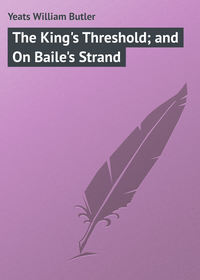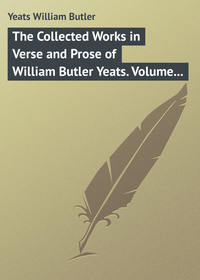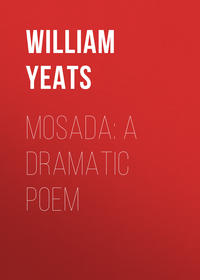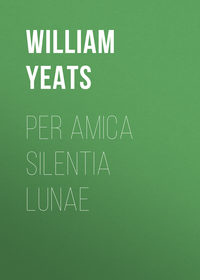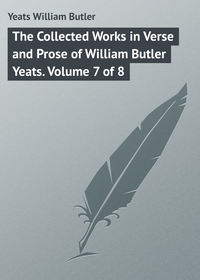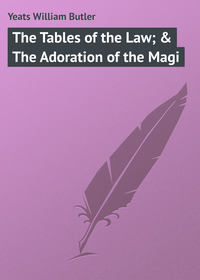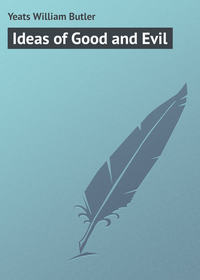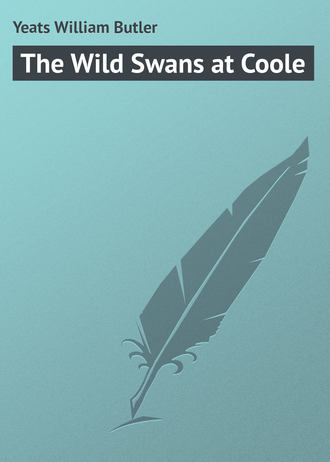 полная версия
полная версияThe Wild Swans at Coole
A THOUGHT FROM PROPERTIUS
She might, so noble from headTo great shapely knees,The long flowing line,Have walked to the altarThrough the holy imagesAt Pallas Athene's side,Or been fit spoil for a centaurDrunk with the unmixed wine.BROKEN DREAMS
There is grey in your hair.Young men no longer suddenly catch their breathWhen you are passing;But maybe some old gaffer mutters a blessingBecause it was your prayerRecovered him upon the bed of death.For your sole sake – that all heart's ache have known,And given to others all heart's ache,From meagre girlhood's putting onBurdensome beauty – for your sole sakeHeaven has put away the stroke of her doom,So great her portion in that peace you makeBy merely walking in a room.Your beauty can but leave among usVague memories, nothing but memories.A young man when the old men are done talkingWill say to an old man, 'Tell me of that ladyThe poet stubborn with his passion sang usWhen age might well have chilled his blood.'Vague memories, nothing but memories,But in the grave all, all, shall be renewed.The certainty that I shall see that ladyLeaning or standing or walkingIn the first loveliness of womanhood,And with the fervour of my youthful eyes,Has set me muttering like a fool.You are more beautiful than any oneAnd yet your body had a flaw:Your small hands were not beautiful,And I am afraid that you will runAnd paddle to the wristIn that mysterious, always brimming lakeWhere those that have obeyed the holy lawPaddle and are perfect; leave unchangedThe hands that I have kissedFor old sakes' sake.The last stroke of midnight dies.All day in the one chairFrom dream to dream and rhyme to rhyme I have rangedIn rambling talk with an image of air:Vague memories, nothing but memories.A DEEP-SWORN VOW
Others because you did not keepThat deep-sworn vow have been friends of mine;Yet always when I look death in the face,When I clamber to the heights of sleep,Or when I grow excited with wine,Suddenly I meet your face.PRESENCES
This night has been so strange that it seemedAs if the hair stood up on my head.From going-down of the sun I have dreamedThat women laughing, or timid or wild,In rustle of lace or silken stuff,Climbed up my creaking stair. They had readAll I had rhymed of that monstrous thingReturned and yet unrequited love.They stood in the door and stood betweenMy great wood lecturn and the fireTill I could hear their hearts beating:One is a harlot, and one a childThat never looked upon man with desire,And one it may be a queen.THE BALLOON OF THE MIND
Hands, do what you're bid;Bring the balloon of the mindThat bellies and drags in the windInto its narrow shed.TO A SQUIRREL AT KYLE-NA-GNO
Come play with me;Why should you runThrough the shaking treeAs though I'd a gunTo strike you dead?When all I would doIs to scratch your headAnd let you go.ON BEING ASKED FOR A
WAR POEM
I think it better that in times like theseA poet keep his mouth shut, for in truthWe have no gift to set a statesman right;He has had enough of meddling who can pleaseA young girl in the indolence of her youth,Or an old man upon a winter's night.IN MEMORY OF ALFRED
POLLEXFEN
Five-and-twenty years have goneSince old William PollexfenLaid his strong bones down in deathBy his wife ElizabethIn the grey stone tomb he made.And after twenty years they laidIn that tomb by him and her,His son George, the astrologer;And Masons drove from miles awayTo scatter the Acacia sprayUpon a melancholy manWho had ended where his breath began.Many a son and daughter liesFar from the customary skies,The Mall and Eades's grammar school,In London or in Liverpool;But where is laid the sailor John?That so many lands had known:Quiet lands or unquiet seasWhere the Indians trade or Japanese.He never found his rest ashore,Moping for one voyage more.Where have they laid the sailor John?And yesterday the youngest son,A humorous, unambitious man,Was buried near the astrologer;And are we now in the tenth year?Since he, who had been contented long,A nobody in a great throng,Decided he would journey home,Now that his fiftieth year had come,And 'Mr. Alfred' be againUpon the lips of common menWho carried in their memoryHis childhood and his family.At all these death-beds women heardA visionary white sea-birdLamenting that a man should die;And with that cry I have raised my cry.UPON A DYING LADY
IHER COURTESYWith the old kindness, the old distinguished graceShe lies, her lovely piteous head amid dull red hairPropped upon pillows, rouge on the pallor of her face.She would not have us sad because she is lying there,And when she meets our gaze her eyes are laughter-lit,Her speech a wicked tale that we may vie with herMatching our broken-hearted wit against her wit,Thinking of saints and of Petronius Arbiter.IICERTAIN ARTISTS BRING HER DOLLS AND DRAWINGSBring where our Beauty liesA new modelled doll, or drawing,With a friend's or an enemy'sFeatures, or maybe showingHer features when a tressOf dull red hair was flowingOver some silken dressCut in the Turkish fashion,Or it may be like a boy's.We have given the world our passionWe have naught for death but toys.IIISHE TURNS THE DOLLS' FACES TO THE WALLBecause to-day is some religious festivalThey had a priest say Mass, and even the Japanese,Heel up and weight on toe, must face the wall– Pedant in passion, learned in old courtesies,Vehement and witty she had seemed – ; the Venetian ladyWho had seemed to glide to some intrigue in her red shoes,Her domino, her panniered skirt copied from Longhi;The meditative critic; all are on their toes,Even our Beauty with her Turkish trousers on.Because the priest must have like every dog his dayOr keep us all awake with baying at the moon,We and our dolls being but the world were best away.IVTHE END OF DAYShe is playing like a childAnd penance is the play,Fantastical and wildBecause the end of dayShows her that some one soonWill come from the house, and say —Though play is but half-done —'Come in and leave the play.' —VHER RACEShe has not grown uncivilAs narrow natures wouldAnd called the pleasures evilHappier days thought good;She knows herself a womanNo red and white of a face,Or rank, raised from a commonUnreckonable race;And how should her heart fail herOr sickness break her willWith her dead brother's valourFor an example still.VIHER COURAGEWhen her soul flies to the predestined dancing-place(I have no speech but symbol, the pagan speech I madeAmid the dreams of youth) let her come face to face,While wondering still to be a shade, with Grania's shadeAll but the perils of the woodland flight forgotThat made her Dermuid dear, and some old cardinalPacing with half-closed eyelids in a sunny spotWho had murmured of Giorgione at his latest breath —Aye and Achilles, Timor, Babar, Barhaim, allWho have lived in joy and laughed into the face of Death.VIIHER FRIENDS BRING HER A CHRISTMAS TREEPardon, great enemy,Without an angry thoughtWe've carried in our tree,And here and there have boughtTill all the boughs are gay,And she may look from the bedOn pretty things that mayPlease a fantastic head.Give her a little grace,What if a laughing eyeHave looked into your face —It is about to die.EGO DOMINUS TUUS
HicOn the grey sand beside the shallow streamUnder your old wind-beaten tower, where stillA lamp burns on beside the open bookThat Michael Robartes left, you walk in the moonAnd though you have passed the best of life still traceEnthralled by the unconquerable delusionMagical shapes.IlleBy the help of an imageI call to my own opposite, summon allThat I have handled least, least looked upon.HicAnd I would find myself and not an image.IlleThat is our modern hope and by its lightWe have lit upon the gentle, sensitive mindAnd lost the old nonchalance of the hand;Whether we have chosen chisel, pen or brushWe are but critics, or but half create,Timid, entangled, empty and abashedLacking the countenance of our friends.HicAnd yetThe chief imagination of ChristendomDante Alighieri so utterly found himselfThat he has made that hollow face of hisMore plain to the mind's eye than any faceBut that of Christ.IlleAnd did he find himself,Or was the hunger that had made it hollowA hunger for the apple on the boughMost out of reach? and is that spectral imageThe man that Lapo and that Guido knew?I think he fashioned from his oppositeAn image that might have been a stony face,Staring upon a bedouin's horse-hair roofFrom doored and windowed cliff, or half upturnedAmong the coarse grass and the camel dung.He set his chisel to the hardest stone.Being mocked by Guido for his lecherous life,Derided and deriding, driven outTo climb that stair and eat that bitter bread,He found the unpersuadable justice, he foundThe most exalted lady loved by a man.HicYet surely there are men who have made their artOut of no tragic war, lovers of life,Impulsive men that look for happinessAnd sing when they have found it.IlleNo, not sing,For those that love the world serve it in action,Grow rich, popular and full of influence,And should they paint or write still it is action:The struggle of the fly in marmalade.The rhetorician would deceive his neighbours,The sentimentalist himself; while artIs but a vision of reality.What portion in the world can the artist haveWho has awakened from the common dreamBut dissipation and despair?HicAnd yetNo one denies to Keats love of the world;Remember his deliberate happiness.IlleHis art is happy but who knows his mind?I see a schoolboy when I think of him,With face and nose pressed to a sweet-shop window,For certainly he sank into his graveHis senses and his heart unsatisfied,And made – being poor, ailing and ignorant,Shut out from all the luxury of the world,The coarse-bred son of a livery stable-keeper —Luxuriant song.HicWhy should you leave the lampBurning alone beside an open book,And trace these characters upon the sands;A style is found by sedentary toilAnd by the imitation of great masters.IlleBecause I seek an image, not a book.Those men that in their writings are most wiseOwn nothing but their blind, stupefied hearts.I call to the mysterious one who yetShall walk the wet sands by the edge of the streamAnd look most like me, being indeed my double,And prove of all imaginable thingsThe most unlike, being my anti-self,And standing by these characters discloseAll that I seek; and whisper it as thoughHe were afraid the birds, who cry aloudTheir momentary cries before it is dawn,Would carry it away to blasphemous men.A PRAYER ON GOING INTO MY HOUSE
God grant a blessing on this tower and cottageAnd on my heirs, if all remain unspoiled,No table, or chair or stool not simple enoughFor shepherd lads in Galilee; and grantThat I myself for portions of the yearMay handle nothing and set eyes on nothingBut what the great and passionate have usedThroughout so many varying centuries.We take it for the norm; yet should I dreamSinbad the sailor's brought a painted chest,Or image, from beyond the Loadstone MountainThat dream is a norm; and should some limb of the devilDestroy the view by cutting down an ashThat shades the road, or setting up a cottagePlanned in a government office, shorten his life,Manacle his soul upon the Red Sea bottom.THE PHASES OF THE MOON
An old man cocked his ear upon a bridge;He and his friend, their faces to the South,Had trod the uneven road. Their boots were soiled,Their Connemara cloth worn out of shape;They had kept a steady pace as though their beds,Despite a dwindling and late risen moon,Were distant. An old man cocked his ear.AherneWhat made that sound?RobartesA rat or water-henSplashed, or an otter slid into the stream.We are on the bridge; that shadow is the tower,And the light proves that he is reading still.He has found, after the manner of his kind,Mere images; chosen this place to live inBecause, it may be, of the candle lightFrom the far tower where Milton's platonistSat late, or Shelley's visionary prince:The lonely light that Samuel Palmer engraved,An image of mysterious wisdom won by toil;And now he seeks in book or manuscriptWhat he shall never find.AherneWhy should not youWho know it all ring at his door, and speakJust truth enough to show that his whole lifeWill scarcely find for him a broken crustOf all those truths that are your daily bread;And when you have spoken take the roads again?RobartesHe wrote of me in that extravagant styleHe had learnt from Pater, and to round his taleSaid I was dead; and dead I chose to be.AherneSing me the changes of the moon once more;True song, though speech: 'mine author sung it me.'RobartesTwenty-and-eight the phases of the moon,The full and the moon's dark and all the crescents,Twenty-and-eight, and yet but six-and-twentyThe cradles that a man must needs be rocked in:For there's no human life at the full or the dark.From the first crescent to the half, the dreamBut summons to adventure and the manIs always happy like a bird or a beast;But while the moon is rounding towards the fullHe follows whatever whim's most difficultAmong whims not impossible, and though scarredAs with the cat-o'-nine-tails of the mind,His body moulded from within his bodyGrows comelier. Eleven pass, and thenAthenae takes Achilles by the hair,Hector is in the dust, Nietzsche is born,Because the heroes' crescent is the twelfth.And yet, twice born, twice buried, grow he must,Before the full moon, helpless as a worm.The thirteenth moon but sets the soul at warIn its own being, and when that war's begunThere is no muscle in the arm; and afterUnder the frenzy of the fourteenth moonThe soul begins to tremble into stillness,To die into the labyrinth of itself!AherneSing out the song; sing to the end, and singThe strange reward of all that discipline.RobartesAll thought becomes an image and the soulBecomes a body: that body and that soulToo perfect at the full to lie in a cradle,Too lonely for the traffic of the world:Body and soul cast out and cast awayBeyond the visible world.AherneAll dreams of the soulEnd in a beautiful man's or woman's body.RobartesHave you not always known it?AherneThe song will have itThat those that we have loved got their long fingersFrom death, and wounds, or on Sinai's top,Or from some bloody whip in their own hands.They ran from cradle to cradle till at lastTheir beauty dropped out of the lonelinessOf body and soul.RobartesThe lovers' heart knows that.AherneIt must be that the terror in their eyesIs memory or foreknowledge of the hourWhen all is fed with light and heaven is bare.RobartesWhen the moon's full those creatures of the fullAre met on the waste hills by country menWho shudder and hurry by: body and soulEstranged amid the strangeness of themselves,Caught up in contemplation, the mind's eyeFixed upon images that once were thought,For separate, perfect, and immovableImages can break the solitudeOf lovely, satisfied, indifferent eyes.And thereupon with aged, high-pitched voiceAherne laughed, thinking of the man within,His sleepless candle and laborious pen.RobartesAnd after that the crumbling of the moon.The soul remembering its lonelinessShudders in many cradles; all is changed,It would be the World's servant, and as it serves,Choosing whatever task's most difficultAmong tasks not impossible, it takesUpon the body and upon the soulThe coarseness of the drudge.AherneBefore the fullIt sought itself and afterwards the world.RobartesBecause you are forgotten, half out of life,And never wrote a book your thought is clear.Reformer, merchant, statesman, learned man,Dutiful husband, honest wife by turn,Cradle upon cradle, and all in flight and allDeformed because there is no deformityBut saves us from a dream.AherneAnd what of thoseThat the last servile crescent has set free?RobartesBecause all dark, like those that are all light,They are cast beyond the verge, and in a cloud,Crying to one another like the bats;And having no desire they cannot tellWhat's good or bad, or what it is to triumphAt the perfection of one's own obedience;And yet they speak what's blown into the mind;Deformed beyond deformity, unformed,Insipid as the dough before it is baked,They change their bodies at a word.AherneAnd then?RobartesWhen all the dough has been so kneaded upThat it can take what form cook Nature fancyThe first thin crescent is wheeled round once more.AherneBut the escape; the song's not finished yet.RobartesHunchback and saint and fool are the last crescents.The burning bow that once could shoot an arrowOut of the up and down, the wagon wheelOf beauty's cruelty and wisdom's chatter,Out of that raving tide is drawn betwixtDeformity of body and of mind.AherneWere not our beds far off I'd ring the bell,Stand under the rough roof-timbers of the hallBeside the castle door, where all is starkAusterity, a place set out for wisdomThat he will never find; I'd play a part;He would never know me after all these yearsBut take me for some drunken country man;I'd stand and mutter there until he caught'Hunchback and saint and fool,' and that they cameUnder the three last crescents of the moon,And then I'd stagger out. He'd crack his witsDay after day, yet never find the meaning.And then he laughed to think that what seemed hard
Should be so simple – a bat rose from the hazels
And circled round him with its squeaky cry,
The light in the tower window was put out.
THE CAT AND THE MOON
The cat went here and thereAnd the moon spun round like a top,And the nearest kin of the moonThe creeping cat looked up.Black Minnaloushe stared at the moon,For wander and wail as he wouldThe pure cold light in the skyTroubled his animal blood.Minnaloushe runs in the grass,Lifting his delicate feet.Do you dance, Minnaloushe, do you dance?When two close kindred meetWhat better than call a dance,Maybe the moon may learn,Tired of that courtly fashion,A new dance turn.Minnaloushe creeps through the grassFrom moonlit place to place,The sacred moon overheadHas taken a new phase.Does Minnaloushe know that his pupilsWill pass from change to change,And that from round to crescent,From crescent to round they range?Minnaloushe creeps through the grassAlone, important and wise,And lifts to the changing moonHis changing eyes.THE SAINT AND THE
HUNCHBACK
HunchbackStand up and lift your hand and blessA man that finds great bitternessIn thinking of his lost renown.A Roman Caesar is held downUnder this hump.SaintGod tries each manAccording to a different plan.I shall not cease to bless becauseI lay about me with the tawsThat night and morning I may thrashGreek Alexander from my flesh,Augustus Caesar, and after theseThat great rogue Alcibiades.HunchbackTo all that in your flesh have stoodAnd blessed, I give my gratitude,Honoured by all in their degrees,But most to Alcibiades.TWO SONGS OF A FOOL
IA speckled cat and a tame hareEat at my hearthstoneAnd sleep there;And both look up to me aloneFor learning and defenceAs I look up to Providence.I start out of my sleep to thinkSome day I may forgetTheir food and drink;Or, the house door left unshut,The hare may run till it's foundThe horn's sweet note and the tooth of the hound.I bear a burden that might well tryMen that do all by rule,And what can IThat am a wandering witted foolBut pray to God that He easeMy great responsibilities.III slept on my three-legged stool by the fire,The speckled cat slept on my knee;We never thought to enquireWhere the brown hare might be,And whether the door were shut.Who knows how she drank the windStretched up on two legs from the mat,Before she had settled her mindTo drum with her heel and to leap:Had I but awakened from sleepAnd called her name she had heard,It may be, and had not stirred,That now, it may be, has foundThe horn's sweet note and the tooth of the hound.ANOTHER SONG OF A FOOL
This great purple butterfly,In the prison of my hands,Has a learning in his eyeNot a poor fool understands.Once he lived a schoolmasterWith a stark, denying look,A string of scholars went in fearOf his great birch and his great book.Like the clangour of a bell,Sweet and harsh, harsh and sweet,That is how he learnt so wellTo take the roses for his meat.THE DOUBLE VISION OF
MICHAEL ROBARTES
IOn the grey rock of Cashel the mind's eyeHas called up the cold spirits that are bornWhen the old moon is vanished from the skyAnd the new still hides her horn.Under blank eyes and fingers never stillThe particular is pounded till it is man,When had I my own will?Oh, not since life began.Constrained, arraigned, baffled, bent and unbentBy these wire-jointed jaws and limbs of wood,Themselves obedient,Knowing not evil and good;Obedient to some hidden magical breath.They do not even feel, so abstract are they,So dead beyond our death,Triumph that we obey.IIOn the grey rock of Cashel I suddenly sawA Sphinx with woman breast and lion paw,A Buddha, hand at rest,Hand lifted up that blest;And right between these two a girl at playThat it may be had danced her life away,For now being dead it seemedThat she of dancing dreamed.Although I saw it all in the mind's eyeThere can be nothing solider till I die;I saw by the moon's lightNow at its fifteenth night.One lashed her tail; her eyes lit by the moonGazed upon all things known, all things unknown,In triumph of intellectWith motionless head erect.That other's moonlit eyeballs never moved,Being fixed on all things loved, all things unloved,Yet little peace he hadFor those that love are sad.Oh, little did they care who danced between,And little she by whom her dance was seenSo that she danced. No thought,Body perfection brought,For what but eye and ear silence the mindWith the minute particulars of mankind?Mind moved yet seemed to stopAs 'twere a spinning-top.In contemplation had those three so wroughtUpon a moment, and so stretched it outThat they, time overthrown,Were dead yet flesh and bone.IIII knew that I had seen, had seen at lastThat girl my unremembering nights hold fastOr else my dreams that fly,If I should rub an eye,And yet in flying fling into my meatA crazy juice that makes the pulses beatAs though I had been undoneBy Homer's ParagonWho never gave the burning town a thought;To such a pitch of folly I am brought,Being caught between the pullOf the dark moon and the full,The commonness of thought and imagesThat have the frenzy of our Western seas.Thereon I made my moan,And after kissed a stone,And after that arranged it in a songSeeing that I, ignorant for so long,Had been rewarded thusIn Cormac's ruined house.1
When I was a child at Sligo I could see above my grandfather's trees a little column of smoke from "the pern mill," and was told that "pern" was another name for the spool, as I was accustomed to call it, on which thread was wound. One could not see the chimney for the trees, and the smoke looked as if it came from the mountain, and one day a foreign sea-captain asked me if that was a burning mountain.
W. B. Y.

